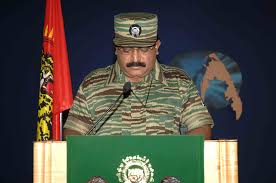Being a Christian Tamil blogger I feel a moral imperative to write about the Tamil Sri Lankans whose plight is currently under the world's media spotlight because of the Commonwealth Heads of State meeting being held there. I don't come from Sri Lanka myself but my ancestors did. I have only visited Sri Lanka once and that was over 40 years ago but I have developed an ethnic kinship and concern since reading about the war and hearing at first hand personal stories of hardship from those who fled the country.
If there is one thing I understand about wars now it is that the headline grabbing news that we watch on TV and read about is made up of the single voices of all the victims. There is a wealth of evidence backed fact about the torture and persecution of Tamils in the country but the history of it all is not well known. This is hardly surprising given that when a war rages over decades - 25 years with Sri Lanka - interest is centred on the number of deaths, who is winning and world opinion of it. Also, since the end of the war in 2009 there have been mounting allegations of war crimes against the Sri Lankan government which overshadows the history of the war.

Sri Lanka is a country made up Sinhalese, Tamils and Muslim people. The powers of the country are concentrated in the hands of the Sinhala people. Sinhala is the official language. Tamils and the Muslims were marginalised by the majority masses and it led to resentment and, eventually, a fight back. The Sinhalese government passed a law in 1956 called the Sinhala Only Act 1956 which enshrined in law favourable status for the Sinhalese. While there was no talk of war at this stage it is important to note that ethnic inter-relations were simmering at this stage. By the 1970s a series of incidents only served to make a bad situation worse
The commonly documented reason for and history of the Sri lankan war starts in 1971 when the government introduced a policy of standardisation to increase the numbers of Sinhalese students going to university. The Tamil students fought back through demonstrations and the first armed act took place in 1971 when a hand bomb was thrown at a politician's car. It failed to kill
him but sparked the armed struggle which eventually led to the setting up of the
Liberation of Tamil Tigers Eelam (LTTE). The leader of the LTTE was
Velupillai Prabhakharan (above) whose first political victim in 1975, ironically, was the politician who had escaped the car bomb.
.
The LTTE were fighting for a separate and independent state in the north and east of Sri Lanka for the Tamils. The LTTE leaders were determined to gain autonomy for the Tamil people whom they thought had suffered enough persecution through the normal layers of life in Sri Lanka i.e education, work, redistributive policies. The LTTE is known as being the most successful terrorist group in the world because it commanded foot soldiers, planes and boats (Sea Tigers photo above) and invented suicide bombing. The organisation killed two world leaders - Rajiv Gandhi (former PM of India) and Ranasinghe Premada (President of Sri Lanka). It was a ruthless organisation that was singled minded in its' pursuit killing civillians and politicians in its' wake. They also recruited child soldiers but ceased this practice after international condemnation.
It is hard to put a figure on how many were killed by both the Sri Lankan government and the LTTE but it easily runs into tens of thousands. The war finally ended in 2009 when the Sri Lankan government managed to destroy much of the LTTE's manpower and firepower. However,
questions have since been raised at UN level and among international countries about the conduct of the government in the final stages of the war and since then. Many LTTE members who surrendered went missing or were found dead with visible signs of torture on their bodies. Many Tamil women who were female Tamil Tigers were found dead afterwards with their clothes in disarray suggesting that they had been raped either before or after being killed.
This is why there has been so much criticism of the Commonwealth Secretariat for choosing to host this year's meeting in Sri Lanka. David Cameron was asked by the Tamil Disapora to abstain from attending but he chose to attend instead and seems to have been successful in drawing world attention to the plight of the Tamils. There is still
no light at the end of the dark tunnel for the Tamils who continue to look for loved ones, who have had their land taken away from them and who have suffered torture themselves.
Please pray for truth and justice to prevail for the Tamils in Sri Lanka.

